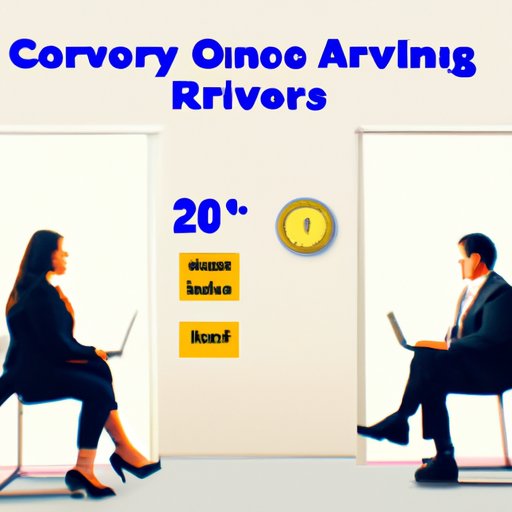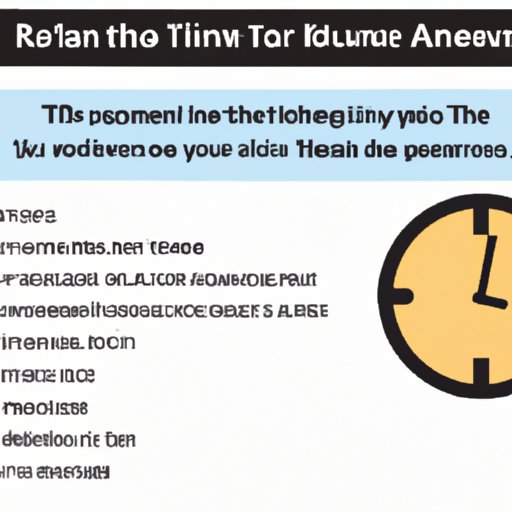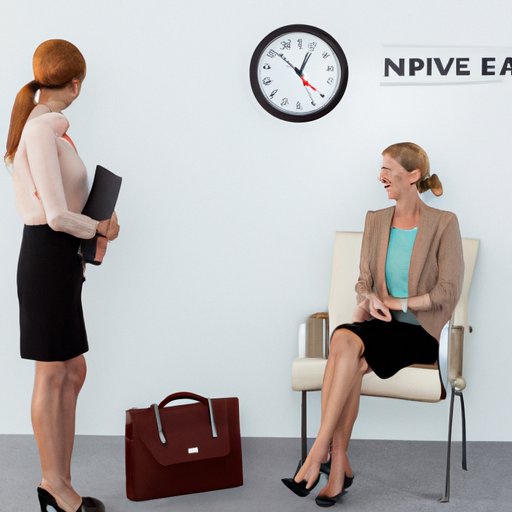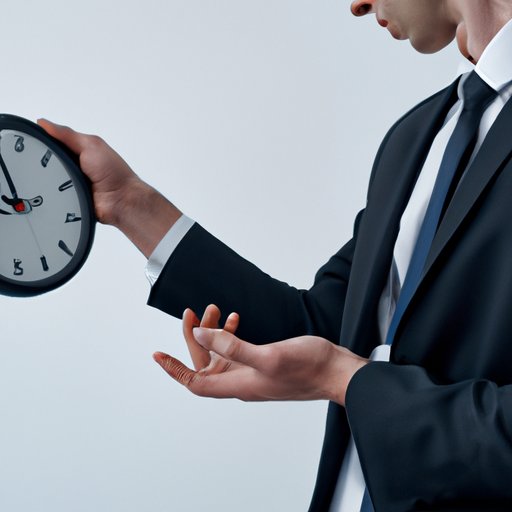Introduction
Arriving to an interview on time is important. It shows that you value the interviewer’s time and that you are serious about the opportunity. But when exactly should you get there? Is it better to arrive early or right on time? This article will explore how early you should be for an interview in order to make the best impression.

Analyzing the Pros and Cons of Arriving Early to an Interview
It is generally accepted that arriving 10 minutes early is ideal. However, there are pros and cons to arriving too early as well. Let’s take a look at both sides of the coin.
Benefits of Arriving Early
Research has shown that arriving early sends a positive message to the hiring manager. According to a survey conducted by CareerBuilder, “82% of employers believe that arriving 15 minutes early for an interview is a good sign.” Being early also gives you the chance to relax and prepare before the interview starts. You can use this time to review your notes, practice your answers, and get in the right frame of mind. It also gives you the chance to observe the company culture and get a feel for the environment.
Drawbacks of Arriving Too Early
On the other hand, being too early could have a negative effect. According to Monster.com, “arriving more than 20 minutes early can be off-putting to the interviewer.” If you are too early, the interviewer may feel like you are wasting their time or that you don’t have enough respect for their schedule. Additionally, if you arrive too early, you may end up waiting in the reception area for an extended period of time. This can be awkward and uncomfortable, and it can make you seem impatient.
How to Find the Balance Between Being Punctual and Too Early for an Interview
The key to finding the perfect balance between being punctual and too early for an interview is to plan ahead. Here are some tips to help you get it just right.
Estimate Travel Time
When planning for an interview, the most important factor to consider is travel time. Estimate how long it will take you to get to the interview location and add a few extra minutes for potential delays such as traffic or public transportation issues. Once you have a good estimate of how long it will take you to get there, you can subtract that from the interview start time to figure out when you should leave.
Consider Potential Delays
When calculating travel time, it’s always wise to add a few extra minutes to account for potential delays. Even if you know the route you’re taking, it’s impossible to predict traffic or public transportation issues. To be safe, give yourself a cushion of 10 minutes or so.
Allow Extra Time For Preparation
In addition to travel time and potential delays, you should also allow yourself extra time to prepare for the interview. This could include reviewing your notes, practicing your answers, and getting into the right frame of mind. Aim for around 10 minutes of preparation time before the interview.

A Guide to Calculating the Optimal Time to Arrive at an Interview
Now that we’ve discussed the basics of arriving on time, let’s take a look at some specific factors that can affect the optimal time to arrive at an interview.
Consider the Time of Day
The time of day can have a big impact on when you should arrive for an interview. If the interview is in the morning, you should aim to arrive 15 minutes early. If it’s in the afternoon, you can give yourself a little bit more leeway and arrive 10 minutes early.
Check the Location in Advance
If you are unfamiliar with the area, it’s a good idea to check the location in advance. This will give you a better idea of how long it will take you to get there and whether there are any potential delays to take into consideration. You can also use Google Maps to get a virtual tour of the area so you know exactly where you need to go.
Research the Company
Before you head off to the interview, it’s important to research the company. This will help you get a better understanding of their mission and values, which will in turn help you make a better impression. Take a few minutes to read up on the company and learn about their history and culture.
What You Should Do While Waiting For Your Interview to Start
Once you have arrived at the interview location, it’s important to remember to stay focused and engaged. Here are some tips on what to do while you wait.
Practice Interview Questions
Use the time before the interview to practice your answers to common interview questions. This will help you feel more prepared and confident going into the meeting. Make sure to practice out loud so you can hear how your answers sound.
Take a Few Deep Breaths
Take a few moments to relax and focus on your breathing. This will help you clear your mind and get in the right frame of mind for the interview. Focus on breathing in and out slowly and deeply.
Review Your Resume
Before the interview starts, take a few minutes to review your resume. This will help refresh your memory and ensure that you are prepared to answer any questions related to your work experience or skills.

How to Make a Positive Impression by Arriving Early to an Interview
Once you have arrived at the interview location, there are several things you can do to make a positive impression. Here are some tips to keep in mind.
Dress Appropriately
First impressions are important, so it’s important to dress appropriately. Make sure to wear something professional and neat, even if the company’s dress code is more casual. This will show that you take the interview seriously and that you are respectful of the interviewer’s time.
Be Friendly With Reception Staff
When you arrive, be sure to introduce yourself to the reception staff. This will show that you are friendly and approachable, and it will also help you make a good first impression.
Stay Focused and Engaged
It’s important to stay focused and engaged while you wait. Avoid using your phone or checking emails, as this could be seen as disrespectful. Instead, take the time to review your notes or practice your answers.
Common Mistakes to Avoid When Arriving Early to an Interview
Finally, here are some common mistakes to avoid when arriving early to an interview.
Don’t Arrive More Than 15 Minutes Early
As we mentioned earlier, arriving more than 15 minutes early can be seen as disrespectful. If you arrive too early, you may end up waiting in the reception area for an extended period of time. This can be awkward and uncomfortable, and it can make you seem impatient.
Don’t Bring Uninvited Guests
When you arrive for the interview, make sure you are alone. Bringing uninvited guests, such as friends or family members, can be seen as unprofessional. Additionally, it can make the interviewer feel uncomfortable and distracted.
Don’t Sit in the Waiting Area For Extended Periods of Time
It’s important to remember that you should only spend a few minutes in the waiting area. Sitting in the waiting area for an extended period of time can make you seem impatient and uninterested. If you arrive more than 15 minutes early, it’s best to find a nearby cafe or park to wait until it’s closer to the interview time.
Conclusion
Arriving early to an interview is important, but it’s also important to strike the right balance. By following the tips outlined in this article, you can arrive on time without being too early. Plan ahead, allow extra time for preparation, and make sure to be friendly and engaged while you wait. By avoiding common mistakes and making a positive impression, you can set yourself up for success.
In conclusion, arriving early to an interview is important, but it’s also important to find the right balance. With careful planning and a few extra minutes of preparation, you can be sure to arrive on time without being too early. Remember to dress appropriately, be friendly with reception staff, and stay focused and engaged while you wait. With these tips, you can make a great impression and increase your chances of landing the job.
(Note: Is this article not meeting your expectations? Do you have knowledge or insights to share? Unlock new opportunities and expand your reach by joining our authors team. Click Registration to join us and share your expertise with our readers.)
